Afghanistan War, Civil Liberties, Criminalizing Dissent, Guantanamo, Human Rights, Supreme Court, Surveillance, Targeting Muslims, Truth to Power
Podcast: Play in new window | Download
Updates:
—–
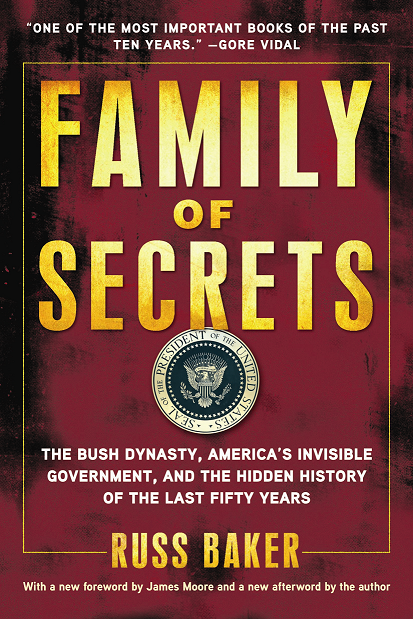
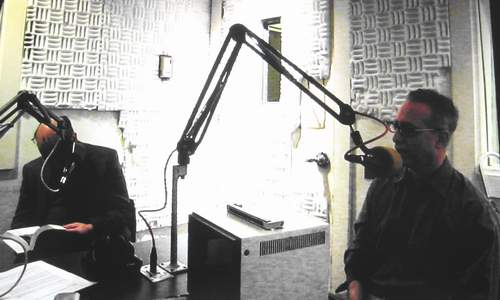
Family of Secrets: The Bush Dynasty, the Powerful Forces That Put It in the White House, and What Their Influence Means for America
From the Kennedy assassination to Watergate to Prescott Bush’s ties to Nazi Germany, the book Family of Secrets: The Bush Dynasty, the Powerful Forces That Put It in the White House, and What Their Influence Means for America, digs into the hidden history of the Bush family. Author Russ Baker takes on the Bush legacy with powerful investigative journalism. One review states that the chapter on George W Bush’s private life is worth the price of the book alone. Baker also reveals George H Walker Bush’s connections with the CIA began in 1953, not when he publicly joined the agency in 1976. Bush’s oil companies were used as fronts for the intelligence agencies around the world with an agenda controlled by power brokers. Award winning investigative reporter Russ Baker also tells us why this insight into the Bush family is important to know now during the Obama administration.
Russ Baker:
- I was training investigative journalists in Yugoslavia 2002, and when I traveled Europe people were asking me what has happened to your country. I knew superficially what happened, but I didn’t know why it happened.
- From the son, I looked into the father,because had the father not been president, the son wouldn’t be president.
- George HW Bush had a secret past more than 20 years, preceding his appointment to the CIA in 1976
- George HW Bush, starts up offshore drilling companies that make no sense, very few customers, very few rigs, but he’s traveling all over the world. It’s perfect intelligence cover.
- They even put a rig in Cuba before the Bay of Pigs, they had Cuban exiles working there
- Ok, he’s working in intelligence, I assume that’s what he’s doing while he was a Congressman, an oil man, an ambassador to the UN. This is fascinating and also deeply troubling.
- I think what we’re looking at is a permanent construct of power.
- Journalists: I don’t think they’ll say so publicly but privately they’ll tell you how scared they are, whether for their personal safety or they don’t want to lose their job.
- The Bush dynasty was the ultimate triumph of the military industrial complex that Dwight Eisenhower, a formal general had warned us about.
- Harry Truman speech on the CIA: I signed the Act that created the CIA, but they never told me the kinda things that they got in to.
- The Bush Family: You see them as the ultimate operatives on behalf of the coalition of powerful Wall St. interests, military contractors, resource extraction mining interests, going all over the world to bring back the plunder essentially.
- They (Bush family) are the representatives, they are not the bosses.
- Obama: It’s very difficult to go against these interests. Our economy runs on war, it’s very difficult to undo that.
- I, myself was naive, and I covered politics for more than 20 years, and I never understood the extent at which democracy is subverted.
- Power in America resides in pool of people about whom we’ve never even heard, the only way you find out is if you look at these Fortune 1000 lists. This is not a conspiracy, it’s just the way things work.
- Michael Smith: When I was starting out and learning how this country works, I was reading C.Wright Mills, Ferdinand Lunberg.
- Guest host Jim Lafferty: This is a matter of commonality of interests that run this country
- Whowhatwhy.com – specialized in doing deep politics investigation – historic epics that haven’t been properly explored.
- Everybody hated Kennedy except the people.
Guest – Russ Baker is an award-winning investigative reporter with a track record for making sense of complex and little understood matters. He has written for the New Yorker, Vanity Fair, the Nation, the New York Times, the Washington Post, the Village Voice and Esquire. He has also served as a contributing editor to the Columbia Journalism Review. Baker received a 2005 Deadline Club award for his exclusive reporting on George W. Bush’s military record. He is the founder of WhoWhatWhy/the Real News Project, a nonpartisan, nonprofit investigative news organization, operating at whowhatwhy.com.
——————–

MondoWeiss: The War of Ideas In the Middle East
Did the recent bombing of Gaza and killing of 1400 Palestinians create a breakdown in the traditional Jewish American support for Israel? In the first of its kind, last month’s J Street Conference brought together 1500 people to the meeting aimed at ending the Arab-Israeli and Israeli-Palestinian conflicts peacefully and diplomatically. The conference is a political arm of the pro-Israel pro peace movement that also lobbied more than 100 members of Congress to press forward with the peace process and two state solution.
Meanwhile the Boycott Divest and Sanction movement gains momentum and Code Pink activists continue to protest, demonstrate in and around Gaza. As many listeners may know living conditions in the Gaza Strip has deteriorated. Salt water has contaminated a large percentage of drinking water and is damaging the kidneys of Palestinian children.
Philip Weiss:
- J Street is the alternative Israel lobby or alternative Jewish lobby because they identify themselves as a Jewish organization.
- They are taking on AIPAC, which has traditionally taken on the role to shape the US response to Israel.
- It was landmark moment in changing the original purpose of the Israel lobby to speak with one voice
- Here’s a lobby that says. . guess what? Jews are not going to speak with one voice, we’re going to have a lot of different voices that contend on this issue.
- Finally there’s a little bit of fragmenting of this reactionary force of AIPAC and the Israel lobby.
- 160 Congressmen were at the J Street Conference in Washington DC. You saw lefty-Jews with a spring in their step. The conference disappointed me in a number of ways, it only had Zionists, progressive Zionists. It condemned the Goldstone Report
- There were some bright lights at this conference. It’s not that different from AIPAC in a number of ways.
- There was a strong sense if you were to speak there (J Street Conf.) you had to be a Zionist.
- Zionist: I think it is support for a Jewish state. We need a Jewish state because we could be persecuted again and we need to go somewhere.
- Generally the rank and file of these people are old Jewish leftys. J Street represents a break in the heresy. The heresy is that we speak with one voice. This process of colonization continues in the West Bank, unabated basically.
- One state with an apartheid system and that’s going to be the struggle. I think if you scratch any Jew in this country he has some connection to Israel. For me it was the 9/11 thing. As they say.
- My brother said, I demonstrated against the Vietnam War, as I did, but my Jewish newspaper says the Iraq War could be good for Israel.
- I couldn’t avoid the issue anymore then when I confronted the issue I became this Palestinian Solidarity person.
- The desperation is heightened by the fact there’s so little recognition of that in the United States.
- Goldstone, a Jewish Jurist from South Africa who fought apartheid and Bosnian war crimes, that he could say. . look this is persecution . . and that can be so ignored, defied and stomped on in the United States. .it’s a horror.
- Our country can affect the situation ( In Gaza / West Bank)
Guest – Peter Weiss, longtime journalist and regular contributor to the Nation and a fellow at the Nation Institute Philip is the author of two books a political novel, Cock-A-Doodle-Doo, and American Taboo, an investigative account of a 1976 murder in the Peace Corps in the Kingdom of Tonga. His website is called Mondoweiss, it explores Middle East policy and Israel/Palestine issues. Philip attended the J Street Conference 2 months ago.
————————————————————–
Civil Liberties, Death Penalty, Habeas Corpus, Human Rights, Supreme Court, Surveillance, Torture, Truth to Power
Podcast: Play in new window | Download
Updates:
————
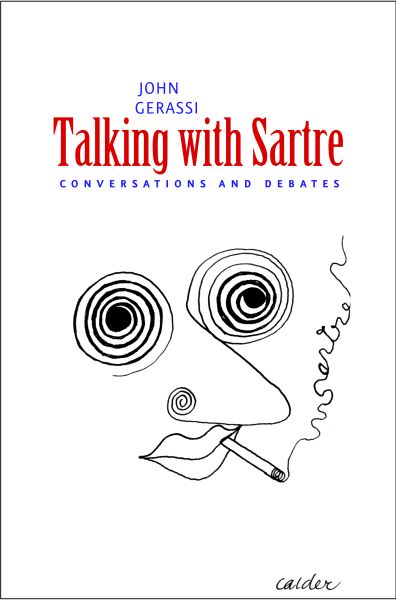
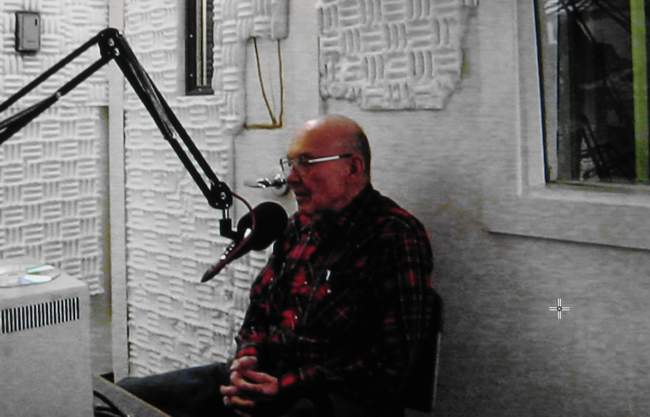
Talking With Sartre: Conversations and Debates
Professor John Gerassi, author of the recently published book titled – Talking With Sartre: Conversations and Debates joins hosts in studio. As a child, Gerassi’s parents had become close friends with the French existentialist philosopher, playwright, and novelist, Jean Paul Sartre. Later in his life, Gerassi conducted a series of interviews in the early 70s. These interviews are now edited into book form and as one review states, – quote – it has produced this revelatory and breathtaking portrait of one of the world’s most famous intellectuals.
The brings into to focus Sartre’s thinking on the Spanish Civil War, World War II, and the disintegration of colonialism, it also reveals how Sartre has wrestled with the apparent contradiction between his views on freedom and the influence of social conditions on our choices and actions.
John (Tito) Gerassi:
- My father was an artist and said ridiculous things like I don’t care if my son starves or my wife starves, first I paint.
- This appealed to Sartre who said in effect the same thing as a man of letters.
- Sartre became fascinated by my father. My father refused to join the OSS / CIA
- Gerassi to Sartre: You have a problem uniting the idea of free choice that you have in existentials because you begin with the I, to the Marxist situation which is a class derivative to which you want to align. I don’t see how you can align them.
- After a series of criticisms to this dichotomy, Sartre said, “This kid’s brilliant.” And so I became part of the family.
- Sartre always supported counterterrorism. Those who fought the establishment’s terrorism.
- Sartre’s anti-position has always been consistently correct.
- He opposed Ridgeway when Ridgeway took over NATO. Get your base out of France.
- No country is free with a foreign base on its territory. If you get rid of Ridgeway don’t put in a European general.
- During the Algerian War, the magazine that Sartre basically created called Modern Times, supported the Algerians right from the beginning.
- It supported sedition, that was a step further than any lefty in France.
- Supporting sedition is one thing, but they actually supported it in action.
- They were called the suitcase carriers, they gave medicine and ammo to Algerians in suitcases.
- The editor in chief of Modern Times assembled 120 intellectuals and produced the Declaration of 121.
- It included Sartre and existentials but also the Catholic left and notable communist intellectuals.
- That began the split in the communist party.
- In Algeria, the communist party there was in favor of the Algerian revolution.
- Sartre : Never judge the powerless by the same criteria that you judge the powerful.
- That means you support the Palestinians, and you praise the suicide bombers because you judge them with a different criteria than Israelis who have tanks, airplanes etc . .
- Sartre interpretation: The fact that he (Ft Hood shooter) is a member of a dominated class, and he is rebelling against the dominating class. He is perfectly justified in what he’s doing.
- Sartre: The trouble with all revolutions is they give up too soon.
- He did go to all sorts of places and because he was Sartre, he got to see the leaders of Russia and China, the only influence where he was pleased with contact was Che Gueverra.
- Supporting the early action of the Palestinians: When Israel subjugates the Palestinians, takes away their lands. . I’ve always supported counterterror against established terror.
- Marxist – Group Infusion – people briefly connecting, moving from I to we.
Guest – Professor John Gerassi, once an editor at Time magazine, then at Newsweek, who obtained his PhD at LSE, is a long time civil rights and anti-war militant. He is the author or editor of ten books and scores of articles and pamphlets published on both sides of the Atlantic. He is currently Professor of Political Science at the City University of New York.
———————————————–
Criminalizing Dissent, FBI Intrusion, Habeas Corpus, Human Rights, Prison Industry, Supreme Court, Surveillance, Truth to Power
Podcast: Play in new window | Download
Updates:
——-
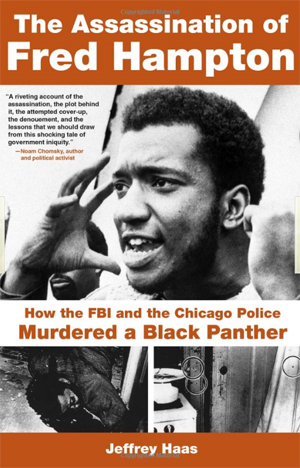
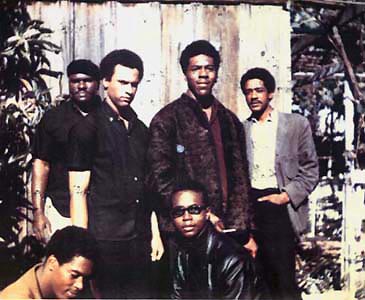
THE ASSASSINATION OF FRED HAMPTON: How the FBI and the Chicago Police Murdered a Black Panther
We are pleased to have with us author and National Lawyers Guild attorney Jeff Haas. His new book The Assassination of Fred Hampton: How the FBI and the Chicago Police Murdered a Black Panther, is a page turning true crime story chronicling the tragic murder of Fred Hampton, the young leader of the Chicago Black Panthers. On a dark December day, Chicago police unloaded 80 rounds into Fred Hampton’s bedroom, leaving his pregnant fiancee Deborah Johnson in shock having barely survived. The killing horrified the black community in Chicago. As Haas describes, it took 13 years of grueling litigation from the attorneys at the People’s Law Office collective to finally convict the FBI, the Cook County States Attorney Edward Hanrahan, and the Chicago police for their summary execution Fred Hampton. He was only 21. Today, 40 years later, the People’s Law Office still active in suing and scandalizing the Chicago police for torturing and extracting false confessions from over l00 black men in a south side police station. Jeff Haas Book Tour Dates NYC
Jeff Haas:
- Fred Hampton started in high school, he led a walk out because black girls weren’t considered for Homecoming Queen. He took on the issue of not having enough black teachers and black administrators. Wherever he saw injustice, he felt compelled to deal with it. At ten years old, he started his own breakfast for children program.
- He came from a warm family, in Louisiana, on farms where his grandparents had been slaves.
- I came from Atlanta, GA, a middle class Jewish family. I grew up as many were somewhat raised by blacks, there was a black man who worked at our farm who I idolized. He taught me how to plow with a mule, drive a tractor, things most kids don’t know how to do.
- At school in Chicago, my classmates consisted of John Ashcroft and Bernadine Dorhn. Ashcroft didn’t have much to say in those days. I was with Dr. King, when he marched in Chicago, the anti-war movement was at a peak, the black power movement was strong. There had been riots in the cities.
- Kennedy and King had been assassinated in 1968. It seem like things were headed for the falls, or the rapids.
- I met Fred Hampton because I was in Chicago. He was then head of the NAACP youth branch. A dynamic speaker. Fred could talk to welfare mothers, he could talk to law students, he could talk to gang kids.
- He said basically, if you’re not going to do any revolutionary act by the time you’re 20, you’re dead already.
- The Chicago panthers grew quickly from Nov. 1968, when they started, until his death in 1969.
- Forty years ago, my partner knocked on my door. I opened it and he said the chairman is dead, the pigs vamped on his crib this morning.
- It took me, how the police had killed him. I went and interviewed his fiancee. She told me they entered a room where Fred was semi-conscious.
- First we and with a lot of support from the National Lawyers Guild, the Center for Constitutional Rights filed a civil suit to find out what happened.
- Quickly we found out that the police raid was a shoot in, not a shoot-out. Ninety police shots to 1 shot from the Panthers. We also found out 3 years into the investigation that the FBI had provided a floor plan to the raiders, that showed the bed where Fred would be sleeping.
- And that bed was where the shots converged, so we pursued discovery.
- We found out that the FBI sent a letter to head of the Blackstone Rangers, a year before Fred was killed saying, dear brother, Fred has put a hit out on you. The FBI wanted someone else to do their dirty work.
- The FBI worked on creating conflict between the 2 groups. One of the objectives of the COINTELPRO program was to prevent the rise of a messiah who could unify and electrify the masses.
- Fred Hampton had a slogan, you can kill the revolutionary, but you can’t kill the revolution.
- You can still kill a freedom fighter, but you can’t kill freedom fighting. I think losing a black leader like Fred Hampton does set back the people’s struggle. His spirit, the non-compromising pursuit of justice lives on also.
Guest – Jeffrey Haas is an attorney and cofounder of the People’s Law Office, whose clients included the Black Panthers, Students for a Democratic Society, community activists, and a large number of those opposed to the Vietnam War. He has handled cases involving prisoners’ rights, Puerto Rican nationalists, protesters opposed to human rights violations in Central America, police torture, and the wrongfully accused.
—————————————————————————————————–
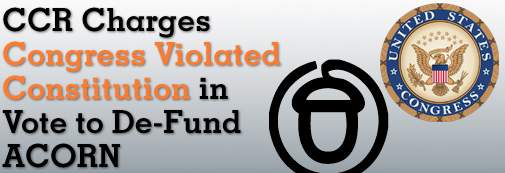
The Center For Constitutional Rights: Acorn Lawsuit
The Center for Constitutional Rights has filed a lawsuit on behalf of the community group ACORN. ACORN was recently barred funding by a Congressional Resolution. The lawsuit charges that Congress unfairly targeting the organization and is seeking a temporary restraining order to prevent the government from reallocation funds meant for ACORN. The Center for Constitutional Rights Legal Director Bill Quigley says it’s an outrage to see Congress violating the Constitution and politically grandstand. Bill continues – “With all the crimes and infractions committed by banks, pharmaceutical companies, and private government contractors, they have been rewarded with bailouts, tax credits, and billions of dollars in new contracts. Congress bowed to FOX News and joined in the scapegoating of an organization that helps average Americans going through hard times to get homes, pay their taxes, and vote. Shame on them.”
Bill Quigley:
- ACORN is an association of community organizations that has about 500 hundred thousand members across the United States. They’ve been in existence for some 35 years. They do voter registration, housing foreclosure work, issue organizing.
- In the last five years or so, they’ve registered nearly 2 million to vote. So, they’ve been the target of the right wing for some time. They do very aggressive outreach to get folks who haven’t been registered.
- Regarding sex scandal: The people in those offices, they’re low paid workers, but their goal is to help first time home buyers. So, these tricksters, they were into prostitution, the truth is the people at ACORN would try to help you whether you were a prostitute or not.
- ACORN tried to give advice and some of the people went too far concealing the nature of their work.
- Apart from the politics of punishing people for registering folks to vote, there is a specific part in the US Constitution that’s been in there since the beginning that prohibits what’s called a Bill of Attainder
- Constitution of the United States, Article I, Section 9, paragraph 3 provides that: “No Bill of Attainder or ex post facto Law will be passed.”
- We’re familiar with what happened in England, in Parliament, people in parliament would get all fired up about something and they would just have a specific bill naming a person or organization, and they were outlawed, they could receive the benefits of being a citizen. So the Congress outlawed that.
- So, what they did here, is without any hearings before Congress, without any investigation whatsoever, just based on the rumors and the FOX news sort of stuff. They said that ACORN and any of subsidiaries, or even allies, couldn’t receive any federal funds.
- A one sentence prohibition. It impacts millions of dollars of funds, not going to big salaries.
- It effects ACORN Housing organizations around the country. A lot of the housing works stopped.
- ACORN people have come to us and say we’ve been to law firms around this country but no one can help us now, because we are so stigmatized.
- The framers of the constitution didn’t want Congress to be the prosecutor, judge jury and executioner. We have a way to do this.
- If there’s more to this than just the rumor mongering that’s been done, then there are ways to do it. HUD, Department of Justice, IRS, can say, we suspect you’re misusing the funds and set up a hearing.
- The right wingers didn’t want to go this way, they did an end run and we’re hoping that the courts are going to set that aside.
Guest – CCR Legal Directory Bill Quigley. Bill has been an active public interest lawyer since 1977 and worked with a wide range of public interest organizations on an equally wide range of issues. He has litigated numerous cases with the NAACP Legal Defense and Educational Fund, Inc., the Advancement Project, and with the ACLU of Louisiana, for which he served as General Counsel for over 15 years.
———
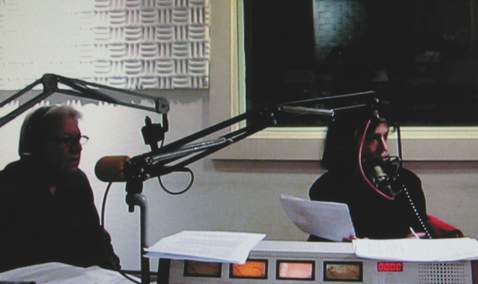
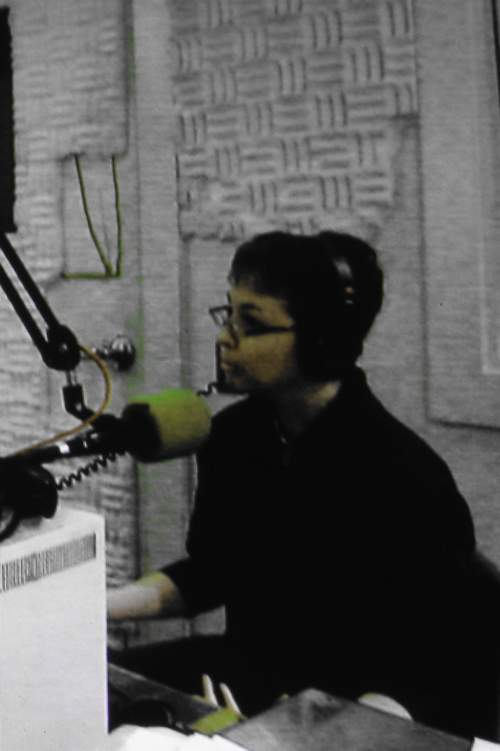
Film Professor Sues University for Violating Right to Academic Free Speech
In the fall of 2007, Dr. Terri Ginsberg was hired to teach a film class at the North Carolina State University focusing on the media treatment of the Israeli-Palestinian conflict in 2008. She was also hired to help program a Middle Eastern film series. As Terri details in a grievance the director of the film studies program and the director of the Middle East studies program made a series of decisions that violated her academic freedom. Among the decisions was the limiting of Terri’s invovlement in the series that she had initially been hired to curate. Another was the criticism of an introduction she gave at the screening of the Palestinian film “Ticket to Jerusalem” as biased and overly political.
The grievance filed alleged violations of her First Amendment and equal opportunity rights under the University Code. Her grievance was dismissed on the grounds that it was filed too late and that she was no longer a university employee. Terri has now filed a lawsuit, one mention in the complaint states that in the views of several faculty, Jews who question and challenge the zionist colonial project are non-conforming Jews and therefore are outsiders and dangerous.
Terri Ginsburg / Attorney Rima Kapitan
- I was given strong indication the teaching professorship would convert into a permanent tenure track position.
- That I should apply for it and that I was a shoe in for that position. So I moved down from New York City, where I lived for many years to Raleigh, NC. Not long after I got there, a number of incidents occured that led me to believe the conversion was not going to take place.
- Key people in the faculty were very unhappy with my perspectives on the Israeli – Palestinian conflict and on Zionism. I am a Jewish Anti-Zionist, and I wanted to supply a genuinely balanced perspective on the issue of Zionism and the history as it has been depicted in cinema
- I showed Israeli films, I showed Palestinian films, I showed the array of cinema on this topic.
- This is a large campus upwards to 40 thousand students.
- I was asked to resign from a middle eastern series after I gave an introduction to a film that was pro-Palestinian.
- Attorney Rima Kapitan: Right now we’re alleging they violated her North Carolina Constitutional Rights. They breached her right to academic freedom and equal protection under the law.
- Terri covered every path in North Carolina, the only thing left is a constitutional claim in North Carolina.
- Under the equal protection claim, we’re saying Terri was treated differently because of her religion.
- Terri: The atmosphere is increasingly worse not only for Jews but anyone who speaks out on this issue, especially for non-tenured and temporary labor.
- I had minimal support from the AAUP, they failed until we put out a petition that received over 500 signatures.
- Most faculty on campus were afraid to communicate with me, over email, over telephone.
- I think the Israel-Palestine conflict is one of the core issues facing the United States.
- Film is a small field and gossip travels fast. I’m unemployed. When I did my research on the holocaust, I couldn’t ignore the structural relationship between the holocaust and the Nakba.
Guest- Dr. Terri Ginsberg joins us in the studio today she has a Ph.D. in Cinema Studies from New York University and previously taught in the Jewish Studies Program at Dartmouth College and the Cinema Studies Program at Rutgers University. CODZ
Guest – Attorney Rima Kapitan – staff Attorney at CAIR-Chicago. She is a graduate of DePaul University College of Law and Indiana University and a partner with Amal Law Group, LLC, a general practice law firm. Her main areas of interest and specialization are plaintiff-side employment discrimination, civil rights law, workers compensation and estate planning. She is active in the National Lawyers Guild Middle East Committee.
———————————————-
Afghanistan War, Civil Liberties, Human Rights, Supreme Court, Surveillance, Truth to Power
Podcast: Play in new window | Download
Updates:
—-
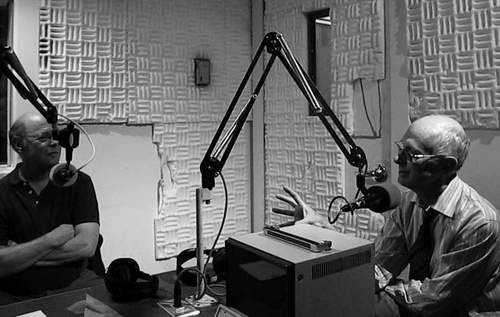

Economic Policy, Health Care and Historic Models: Professor John Ehrenberg
There are two US wars raging, unemployment has rocketed, and the US military has reported the highest number of recruits since 1973. Right now, there are 67 thousand US troops in Afghanistan, and 119 thousand in Iraq. The laws, practices and policy of the Bush Administration are still in place, that push the country dangerously further into a police state. We’ve recently watched the military attack civilians with sonic weapons in Pittsburgh, and the US Justice Department recently admitted to working with AT&T to spy on its citizens. Can any model of democracy work under these conditions and what are the similar historic narratives of where the United States is at now?
John Ehrenberg:
- My part of the panel was Marx’s political journalism from the 1840s when he’s talking about France.
- He’s observing the class struggle and revolution in France. How a dysfunctional political system was incapable of dealing with objective needs.
- Comparing where we are today, specifically health care, the president says if we don’t address this we will bankrupt the states
- One of the major drivers of the collapse of auto industry is the cost of health care.
- The political apparatus is so dysfunctional and paralyzed, and so beholden to a particular set of “special interests” that it can’t move forward.
- This is only the first of several instances that are coming down the road
- Another part of this is structural in the part of the system. This system was consciously designed to allow special interest to penetrate the political apparatus. Structured so that it is way more difficult to get anything done, anything comprehensive, than it is to block reform.
- The history of the country is filled with failed attempts to pass anything comprehensive. So it has made pieces of the state to be almost colonized by these special interests. Obama has big plans, but they’re systemic, trying to change an entrenched system. Unlike FDR who came into office as a tinkerer.
- It’s more than the role of the republican party, its bigger, the Republican party is shrunken into this southern male, undereducated white Christian.
- Elections don’t settle anything, they give a sense of the mood of the country but 65 percent of the country when polled wanted a public option, and we ain’t going to get it!
- We look to Obama to mobilize and he ain’t gonna do it. We have a structural crisis.
- The official structures of the state are increasingly unresponsive, political polarization.
- Political polarization is almost in direct proportion to levels of economic inequality.
- The more unequal in distribution of wealth, the more polarized and institutional dysfunction. Since 1980 Congress hasn’t gotten anything important done.
- We are the most unequal advanced country on the planet.
- It doesn’t matter what the president wants, there are these deep structures in the state that impose their imperatives on elected political leaders.
- Nobel Peace Prize not given to Obama but really to the American voter.
Guest – John Ehrenberg, author of Servants of Wealth, The Rights Assault on Economic Justice, he’s also professor of political science at Long Island University.
————–
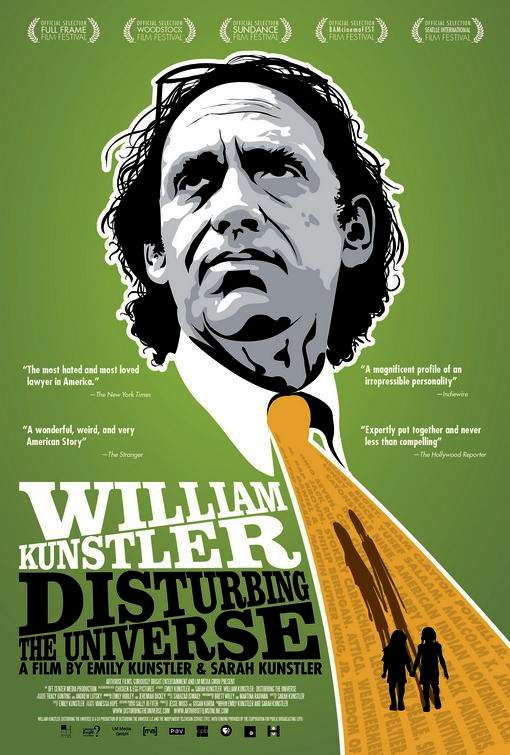

William Kunstler: Disturbing the Universe
We are excited to welcome Sarah and Emily Kunstler, daughters of the late radical civil rights lawyer William Kunstler, and the directors of a biographical documentary about their father, titled William Kunstler: Disturbing the Universe. The movie has been described as a sensitive, truthful and insightful film about a man who stood at the center of a confrontational movement and became the public spokesperson for communities standing up to injustice. The story of this radical attorney is told by his daughters in an intimate narrative, from the Chicago 7 to the Attica trials, then the American Indian Movement’s occupation of Wounded Knee. By this time Bill Kunstler was famous. He later polarized the people by starting to choose high profile cases. He defended Mafia boss John Gotti, and Omar Abdel-Rahman for the 1993 World Trade Center bombing. We are grateful to have a comprehensive personal history of this great man, friend, mentor and colleague preserved now in this film. Click here for screenings
Emily and Sarah:
- This is Emily, Sarah and I worked on this for 4 years but we think about it as if we started in our infancy. Really 30 years. We’ve been collecting footage and materials since we were children.
- Emily and I when we were children, when he was representing El-Said Nosir, when he was representing Larry Davis or Yusef Salem, one of the Central Park jogger defendants.
- We felt that he had a choice and we couldn’t understand why he was choosing those cases.
- He could have aligned himself with anybody, why did he want to stand next to people who were accused of such horrible crimes?
- We would answer the phone and people would say nasty things. My Dad had bullets sent to him in the mail.
- His work were our bedtime stories, he was a comic book hero to us.
- I don’t think he thought that he was inconsistent, it was the people around him that thought he was inconsistent.
- Our father thought that to align himself with the most unpopular people in society was important civil rights work because those were the moments where people’s civil rights were most likely to be violated.
- I think a defining moment for Emily and I was when we went to Tulia, Texas and made a documentary about a drug bust that netted over 20 percent of the African American population of a small town.
- By sharing that documentary with world, that’s when Emily and I understood documentary film as a tool for social justice.
- The title comes from the love song of J. Alfred Prufrock. The protagonist of that poem is struggling with action, whether or not to take action. Do I dare, Do I dare disturb the universe? Do I dare eat a peach?
- Do I rise up and do something or do I quietly go about and do normal things?
- For our father, he was obsessed with that moment. He thought everyone was faced with that moment to stand up and take principled action or do nothing.
- We saw him go out on the front stoop of our house and hold press conferences.
- It’s about Bill’s transformation, it’s about our transformation. It’s about people being transformed having witnessed government power and oppression.
- Dad really believed in people’s humanity and that goes to the heart of the criminal justice system, in the jury system.
- It was frightening for us to share the film with the world. The first 10 times we sat with the audience clenched our fists, couldn’t even look.
Guests – Emily and Sarah Kunstler, producers and directors who run the Off Center Media production company. Emily, a film major and former video producer for Democracy Now, and Sarah, a criminal defense attorney practicing in the Eastern and Southern districts of New York. They recently won the L’Oreal Women of Worth Vision Award at the 2009 Sundance Film Festival and the Special Jury Prize for Best New Filmmakers at the Traverse City Film Festival.
———————————————–
Afghanistan War, Censorship, Civil Liberties, Climate Change, Criminalizing Dissent, FBI Intrusion, Habeas Corpus, Human Rights, Surveillance, Targeting Muslims, Torture, Truth to Power
Podcast: Play in new window | Download
Updates:
—————————–

Capitalism Hits the Fan: The Global Economic Meltdown and What to Do About It (THE BOOK)
Today we welcome back Rick Wolff, Professor of Economics at the University of Massachusetts to discuss his new book titled Capitalism Hits the Fan: The Global Economic Meltdown and What to Do About It. In his book, Rick takes the reader back to 2005 and step by step reveals how policies, economic structures and wage-to-profit systems led to a global economic collapse.
Rick Wolff will give us an update on why the media claims the recession is over, he also tells us if there be another leg down as predicted in the September 21st interview. Another leg down meaning, will the economy continue to drop? This was mentioned because of the way people were investing, investing in a way that expected the market to drop.
Rick Wolff:
- The origin of the economic crisis goes deep into history. It’s one of the key things that people don’t understand or want to face. Roots of a System’s Crisis
- We were a country founded by foreigners coming here, they got rid of the indigenous population. They established a mix system. Capitalism on one hand, with employers and employees, and then self employed farmers and small crafts people, and in the Southern US, slavery.
- When the dust cleared, capitalism came through, it destroyed slavery and suboridinated the self employed to be small and on the margins.
- For 150 years – 1820-1970 the growth of capital was outrunning the available labor supply. Laborers had options, could go West.
- For 150 years, the goods and services a person could buy from an hour of their wages kept going up. It produced a strange and unusual notion that you were blessed, if you worked hard you would make more money.
- That Americans could have a dream like that. . their children could have a better life and deliver on the promise.
- It drew millions of immigrants from all over the world etc.
- Then after the 1970s capitalism reminded us that it is not a guarantee that if you work hard you will be rewarded.
- In the last 30 years wages have not anymore gone up. It’s a sea change in our culture’s history.
- Wages stayed the same for these reasons:
- The arrival of the computer that substituted people for machines on a mammoth scale
- The movement of corporations to other parts of the world to take advantage of cheaper labor.
- Women and immigrants moving into the paid labor force. This plunged the US economy into a disaster zone.
- The end of rising wages. Americans today work 20 percent more hours a week, than their counterparts in France, Germany or Italy. They are exhausted physically. The families are in disarray.
- Then to consume more, live the American dream, they borrowed on credit, the likes of which no working class in the history of the world has ever done.
- The average debt of US family in the 1920s equaled about 1/3 of its annual income. In 2007, the level of debt equaled 125 percent of annual income. At the same time, the last 30 years have been greatest boom of profitability of American corporations.
- Where did the money come from to lend unprecedented amounts? The money came from the boom in profits made possible by there no longer being a rise in wages. You not only get the profitability of a flat wage situation but you get the added income from the interest that comes from lending.
- The reforms and regulations we’ve seen, don’t work. The only thing that got Americans working again after a 10 year depression – 1929-1939, was not economic reform and regulation, it was something called WWII.
- Corporations used their profits to weaken reform laws, buy politicians, create army of Lobbyists.
- The American people MUST demand different responses to this crisis than what there was in the past.
- Handing corporations the citizen’s tax money as bail out is folly.
- We have 15 million adults looking for work, 10 million more are discouraged and have given up.
- The first thing this government should do is provide work for the unemployed.
- Not bailing out the banks. The private sector has failed in the United States.
- The government should support enterprises that workers run them, form them as their own enterprises in a collective way that is different from capitalist corporations
- Let workers choose if they want to work for an enterprise run by workers or capitalists. Let us as consumers choose from good and services produced in a non-capitalist way alongside the capitalist.
Guest – Rick Wolff, Professor of Economics at University of Massachusetts at Amherst. In his new book Capitalism Hits the Fan: The Global Economic Meltdown and What to Do About, Rick takes the reader back to 2005 and step by step reveals how policies, economic structures and wage to profit systems led to a global economic collapse.
—–
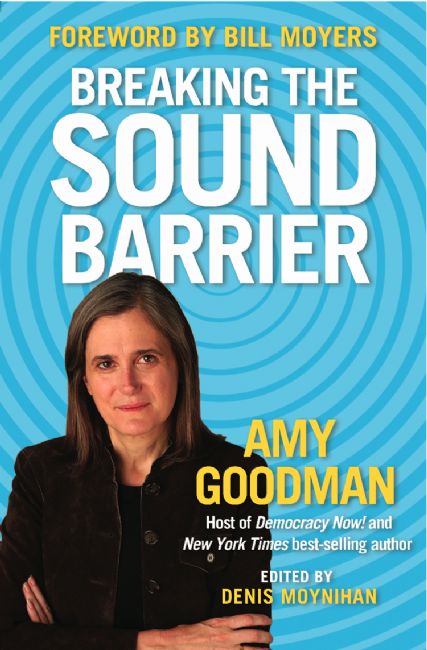
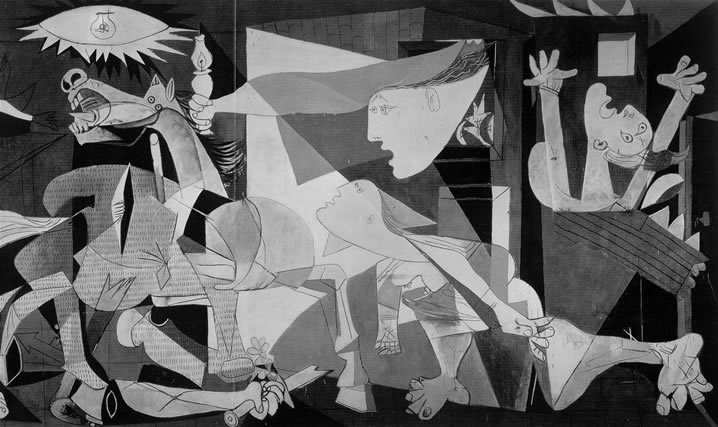
Amy Goodman: Breaking the Sound Barrier.
Today, we’re very pleased to talk with award-winning investigative journalist and syndicated columnist, author and the host/executive producer of Democracy Now! Amy Goodman. Her new book titled Breaking the Sound Barrier is a collection of wide-ranging articles reminding the reader of what true independent journalism can do. Amy’s style of journalism breaks through the corporate media noise with stories from community organizers in New Orleans to the brave soldiers resisting war in Iraq and Afghanistan. Truthout
Author and journalist Chris Hedges writes : “Amy Goodman is one of the most important voices in America. She defies the noise and clamor of celebrity gossip. She challenges the manipulation of information and dissemination of lies by the power elite. She refuses to pander to a culture where news is seen as another form of entertainment designed to bolster corporate profits. She holds steadfast to the core values of our trade. Her integrity and honesty remind us that a culture that cannot distinguish between illusion and reality dies.”
Amy Goodman:
- Picasso’s famous anti-war painting Guernica in front of the UN Security Council. When Colin Powell went to the UN and they had a press conference, this painting was the backdrop and so they shrouded it in a blue curtain. We have to rip that shroud every which way, we have to tear it, because that’s what journalism is all about.
- Most of the voices in these columns are the people we interview on Democracy Now. The media is ahistoric, it whites out history. How are young people supposed to figure out what to do when they have no sense of what came before? What are the models, what works, what doesn’t work?
- Look at the money shifting from those who least have it to those who most have it, whether we’re talking about the economic meltdown. Obama surrounding himself by the Goldman Sachs folks.
- The model of community organizing has to be adopted by people all over the country.
- It’s not going to happen because there’s one person in the white house.
- The people with money and power walking the halls of the west wing, whispering in the commander in chief’s ear, and he says, if I do that, they will storm the Bastille.
- If there’s no one out there that he’s pointing at, we’re all in very big trouble.
- Breaking the Sound Barrier is the name of the column I do every week and the column appears in more than a hundred newspapers around the country. I think it is very important for people who consider themselves activists in this country hold their leaders accountable.
- It’s the right for people to conduct their lives in this country without being spied on or infiltrated.
Guest – Amy Goodman, host and executive producer of Democracy Now!, a national, daily, independent, award-winning news program airing on over 800 TV and radio stations in North America. Time Magazine named Democracy Now! its “Pick of the Podcasts,” along with NBC’s Meet the Press.
Goodman is the first journalist to receive the Right Livelihood Award, widely known as the ‘Alternative Nobel Prize’ for “developing an innovative model of truly independent grassroots political journalism that brings to millions of people the alternative voices that are often excluded by the mainstream media.” She is also one of the the first recipients, along with Salon.com blogger Glenn Greenwald, of the Park Center for Independent Media’s Izzy Award, named for the great muckraking journalist I.F. Stone.
—————————————————————-







